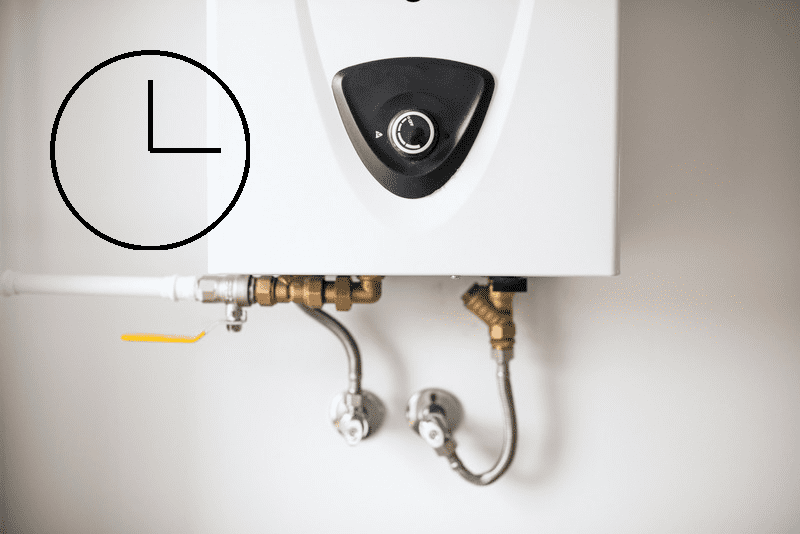When you shower or use hot water from the faucet, you may have to give it a few seconds to warm up, but how long does it take for your water heater to actually heat up? It’s true different types and sizes of water heaters take different lengths of time to heat up and provide you with water at the desired temperature.
We usually recommend that your water heater be set no higher than 120 degrees Fahrenheit. Knowing how your water heater heats up and how to optimize heating time will help you save money on utility bills. This includes keeping up on regular maintenance and considering an energy-efficient water heater for your home.
When your water heater heats up, multiple factors go into that process, like the type, size, and gallons that it holds, its power source, as well as the initial temperature and source of the water. With all these variables playing a part, we want you to know how to use your water heater so it makes the most sense for you and your household needs.
How Long Does It Take Different Types of Hot Water Heaters to Heat Up?
Different types of water heaters take different lengths of time to heat up. The following is the time it takes for the water heater to get up to the 120-degree setting:
- 40-gallon gas water heater – 30 to 45 minutes.
- 40-gallon electric water heater – about 60 minutes.
- 50-gallon gas water heater – 30 to 45 minutes.
- 50-gallon electric water heater – about 60 minutes.
- Tankless water heater – no wait time; hot water is provided on demand.
How Long Does It Take Hot Water to Come Back with Gas Water Heaters?
Several factors determine the time it takes for hot water to heat back up like:
- Recovery time – gas water heaters have a faster recovery time than electric water heaters. A gas water heater can recover 30-40 gallons per hour.
- Temperature rise – the time it takes to heat the water from the temperature it is to the desired temperature.
- Distance and plumbing – the time it takes for the water to get from the tank to the appliance you are using can be extended for larger homes.
How Long Does It Take for Electric Hot Water Heaters to Heat Up?
Many factors can contribute to the time it takes for an electric water heater to heat up. Some of the factors that are included in this are:
- Tank capacity
- Wattage of heating elements
- Temperature rise
- Initial heating time
- Recovery time
- Efficiency and standby losses
However, the actual heating can vary based on the specific water heater model, the water’s initial temperature, and other factors.
How Long is the Heating Time for Tankless Water Heaters?
A tankless water heater is the quickest to heat up due to the amount of BTU required to heat the water. It provides endless hot water and takes very little time to heat up, around 5-15 seconds. Tankless water heaters are on-demand water heaters, and the heating process starts almost instantaneously. The water heats up as it passes through the unit.
Factors Affecting Heating Time
Tank Capacity and Water Volume
Tank capacity is a crucial factor in the heating speed of the water; the capacity is how much your tank holds. Your water heater’s capacity and volume can affect heat speed time. Larger tanks will, of course, take more time to heat up from a cold start. Larger tanks also provide more hot water before running out, which can be beneficial for larger households. Small tanks heat up faster at first and recover quicker if demand is low in the household.
BTU Rating and Heating Element Efficiency
BTU, or British Thermal Unit, is the rating of a gas water heater’s heating capacity, so it directly impacts the speed and efficiency of the heating. If the BTU rating is higher, then it means faster heating. When the BTU is higher, the water heater can generate more heat, leading to faster water heating. Something else that BTU rating affects when heating the water is the recovery rate, which is the amount of water the water heater can produce in an hour. The higher the BTU rating, the higher the recovery rate. When the BTU is higher, you want to pay close attention to high operating costs. It’s essential to balance the BTU rating so you can manage your utility bill costs. High-efficiency models have features that make better use of BTU, so you don’t have high fuel consumption.
Initial Water Temperature
The time of year can actually impact the heating time of the water. The temperature of the groundwater can also affect the heating speed. If groundwater in the winter comes into the home at 50 degrees, it has to raise the water temperature to 70 degrees to get it to the 120-degree temperature your water heater is set to. In the summer, the groundwater is around 65-70 degrees, and it only has to heat the water 45-55 degrees to get to the 120-degree temperature.
Improving Water Heater Efficiency
Installation Considerations to Reduce Heat Up Time
When installing a water heater, there are some things to consider, such as efficiency and heat time. First, it is the type of water heater you have installed in your home, like a tankless water heater, which provides hot water on demand and eliminates heat losses that could happen with other units. Heat pump water heaters are also highly efficient because they use electricity to move heat from the air and ground to heat water. Another thing you can do is install low-flow fixtures in your home – low-flow fixtures like showerheads and faucets can reduce the amount of hot water used. Fixing leaks or dripping faucets will prevent unnecessary water waste.
Maintenance Tips to Keep Heating Time Low
One maintenance tip to keep heating time low is flushing the sediment from your water heater. Sediment or mineral deposits sit at the bottom of the water heater and are corrosive to the tank, causing damage over time. Your water heater should be flushed yearly to empty the sediment and maintain longevity. We recommend calling a Logan Services expert to flush your system, especially if your water heater is old (10-15 years old) or has never been serviced.
Checking and Adjusting the Thermostat Settings
Setting your thermostat to a lower temperature on the water heater reduces the amount of energy needed to heat the water. For efficiency, the U.S. Department of Energy recommends setting it to 120 degrees Fahrenheit. If your thermostat is set to a higher temperature, it will require more heating time.
Troubleshooting Common Issues
What to Do If Your Water Heater Takes Too Long to Heat?
If you use all the hot water, heating time will always be delayed. You can extend your hot water by installing a mixing valve that connects to the water heater’s hot and cold sides. You then turn the water heater’s temperature up to the highest setting and set the mixing valve to 120 degrees. It will help to extend the amount of hot water you have for a time. Other things that you can check if your water heater is taking too long to heat up are:
- Thermostat settings
- Inspect the heating elements (electric water heaters)
- Check the pilot light or burner (gas water heaters)
- Sediment/mineral build-up
- Insulate the water heater pipes
- Check for leaks
- Assess the water heater’s size
- Test the dip tube
- Examine the venting system (gas water heaters)
- Verify power supply (electric water heaters)
You can also upgrade to a larger unit, insulate your water heater to help retain heat and perform regular maintenance. You also want to consider the age of the system. If it is more than 10-15 years old, it might be time for a water heater replacement.
When to Call a Professional
Knowing when to call a professional for your water heater is essential to avoid a water emergency; you don’t want to come home to a leak somewhere in the house. Call our team if you notice cold showers or the hot water only lasts briefly. Our trained plumbing experts will be able to check through your system and find the issue. They will walk you through the steps to fix it and are more than happy to help with any plumbing issues you may be facing.
Knowing your type of water heater and how long it takes to heat up is essential to your home’s comfort level. You can become familiar with the heating speed and know when something doesn’t feel right or normal. We always recommend that you inspect the unit for leaks and have regular maintenance performed to flush and remove sediment from the system. When it comes to the efficiency of your system, you can always ensure that the system is well insulated, the thermostat is adjusted correctly, the unit is well maintained, and you can always consider the age of the water heater and switch to a more efficient model.





















